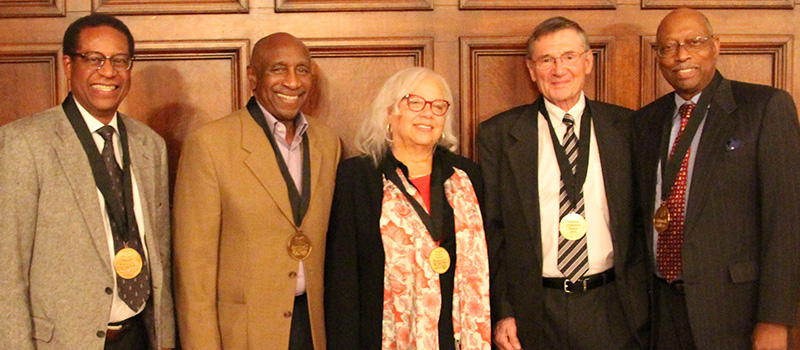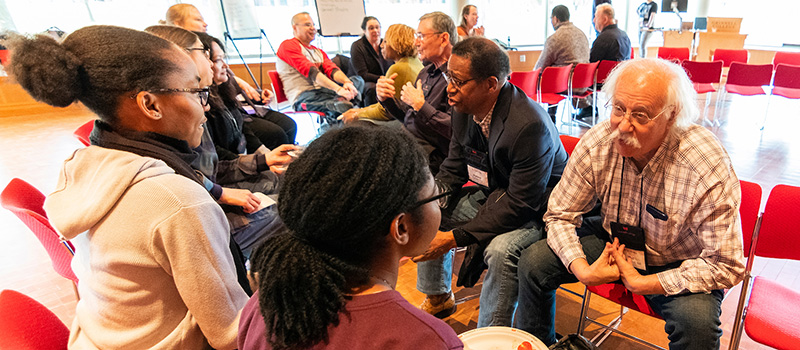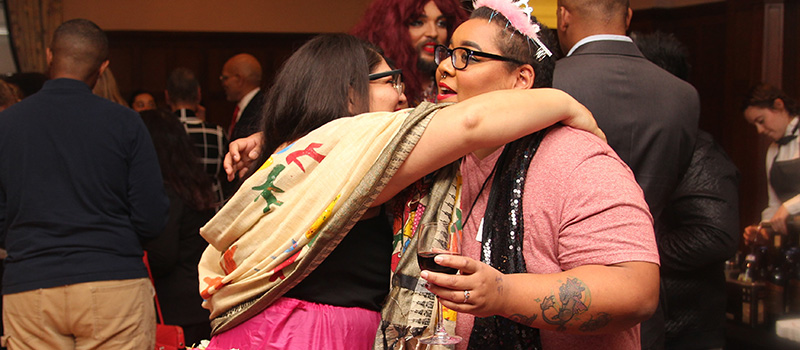Identities celebrated at Grinnell’s second Multicultural Alumni Weekend
Nov. 13, 2019 — When Hubert Farbes ’69, Roy Walker ’69, and Henry Wingate ’69 arrived at Grinnell College in the fall of 1965, in some respects they were just like any other first-year students.
They had the same fears and challenges regarding leaving home and transitioning from high school to college. Additionally, because of their skin color, they were being placed in an environment where they were not certain of acceptance, Farbes said.
“The way in which we dealt with that environment turned out to have institutional significance, but that’s not as important as the memories and emotion that I felt about Grinnell,” Farbes told the audience Saturday at a gala dinner. “Grinnell stands for social justice. While it does not always happen every day and for everyone, the institution means that. You are part of the institution, so make it mean that.”
 Hubert Farbes ‘69, left, Roy Walker ‘69, Merryll Penson ’70, Grant Crandall ’69, and Henry Wingate ’69 received the 2019 Diversity Champion Award for their efforts as students to start Concerned Black Students and the Black Cultural Center.
Hubert Farbes ‘69, left, Roy Walker ‘69, Merryll Penson ’70, Grant Crandall ’69, and Henry Wingate ’69 received the 2019 Diversity Champion Award for their efforts as students to start Concerned Black Students and the Black Cultural Center.
Themes of acceptance, inclusion, diversity, and identities were brought up often during the second annual Multicultural Alumni Weekend Friday through Sunday on the Grinnell campus. The weekend brought together 120 alumni, family members, and friends from all over the country to participate in events, discussions, panels, entertainment, and celebrations of the people, places, and identities that make the College uniquely Grinnell.
The weekend began with a Looking Back and Leaping Forward workshop where participants connected their personal stories with the narrative of surviving and thriving at Grinnell.
At the Invisible Identities Panel Friday, panelists talked about how they embrace their identities in a world that too often dehumanizes marginalized people.
In her 20s Graciela Guzmán ’11 said she was just trying to survive in society. But as she begins her 30s, her attitude has shifted. She isn’t trying to change people’s mind about her identities.
“I am unapologetically living in joy and not caring about what society thinks,” she said. “I wish I had adopted this approach much earlier in life.”
Debbie Gottschalk ’90 sees offensive comments as an educational opportunity, often explaining, for instance, what attention deficit hyperactivity disorder (ADHD) is.
“Rather than feeling marginalized, my identities are where I feel roots. It’s where I fit,” she said.
 Multicultural Alumni Weekend attendees exchange stories during the Looking Back and Leaping Forward workshop on Friday.
Multicultural Alumni Weekend attendees exchange stories during the Looking Back and Leaping Forward workshop on Friday.
Panelists also discussed the benefits of having an invisible identity. Maya Larson ’22 sometimes turns off her hearing aid as a temporary escape from the world. Another blessing is that she has truly compassionate friends.
“Because I’m not ‘normal’ I know people in my life really care about me,” she said.
The festivities continued Friday evening with a Welcome Dinner and Shabbat Table at the Grinnell College Golf Course led by Rabbi Rachel Weiss ’98, followed by a Kosher/Soul keynote speech from Michael Twitty. Saturday’s events included a Diversity Professionals Panel moderated by Lakesia Johnson, chief diversity officer, and open houses by many student organizations.
Also Saturday, audience members heard four presentations of historical research projects that centered on the stories of marginalized people. Henry Brannan ’21 discussed discoveries he made during the writing of a paper about Indigenous Land Histories, recent graduate Erik Henderson ’19 shared materials from the College library’s special collections documenting student protests on the Grinnell campus in the 1960s and 1970s, Sarah Cornell ’97 spoke about the community-based project to gather and present the histories of LGBT people in New Hampshire’s Seacoast Region, and Emeritus Professor Dan Kaiser gave a sneak preview of his soon to be published book Early African Americans of Early Grinnell.
On Saturday evening, attendees took part in the Multicultural Alumni Weekend gala dinner at Quad Dining Hall. One of the highlights was the presentation of the 2019 Diversity Champion Award to five individuals who were in instrumental in the foundation of Concerned Black Students (CBS) and the Conney M. Kimbo Black Cultural Center (BCC): Farbes, Walker, Wingate, Grant Crandall ’69, and Merryll Penson ’70.
“We’re here to honor five heroic, courageous, brilliant, overachieving pioneers, no pun intended,” said Dianne Jones ’74 before introducing the founders. “We are honoring them because they did something. They didn’t just talk or think about it. They did it.”
During the tumultuous years of the late 1960s, Grinnell’s black students were inspired and empowered by the social movements taking place throughout the U.S. Concerned Black Students, an organization founded in 1967, asked that a black student center be built to celebrate and preserve black culture and history for the Grinnell community. The BCC is celebrating its 50th anniversary this year.
As a Grinnell student, Wingate thought African Americans should get together just to have an idea what direction they wanted to travel. He was living in Smith Hall with Walker at the time.
“We decided that direction should be putting together a black student organization, though we didn’t initially want to use the word black because it was a bad word at the time,” Wingate recalls. “Once we said we wanted to have an organization, you know what happened. All of us got together and said ‘right on, that’s exactly what we need.’ Wrong. They said ‘we don’t need it.’ They thought it would be segregation. That organization’s name is Concerned Black Students. We named it that because we couldn’t even agree on having an organization, so we wanted to name it something neutral.”
Penson told the audience about living in the BCC the first year it was open. She and Jones said it was usually referred to as the House at the time.
“It was a place that was home,” Penson said. “It provided an opportunity for us to talk about our issues. We didn’t always agree, but a lot of people were visionary and shared their ideas. The BCC provided a space where we could talk.”
Walker hadn’t returned to Grinnell for a visit in the 50 years since he graduated. After two days of reuniting and hearing about the College’s commitment to diversity and inclusion, he was excited about the future of Grinnell students.
“They are determined to make these changes,” he said. “The energy, commitment, curiosity, and focus that I have observed is great. There is strength in diversity, there is power in diversity.”
The weekend concluded with a Black Church service led by Rev. Brian Smith ’94 and a performance by the Young, Gifted, and Black Choir.
Multicultural Alumni Weekend attendees also learned about and contributed to the Multicultural Digital Archive Project. Organized by Kathi Matsuura ’90, Chris Wilde ’88, and student researchers, an online platform has been established for collecting and documenting the histories of Grinnell’s multicultural student organizations. The goal is to capture and share intuitional memory that has gone undocumented and show how it has shaped the College’s history.
 Graciela Guzmán ’11, left, hugs Deka Spears, intercultural affairs program coordinator, during a social hour at Main Lounge on Saturday.
Graciela Guzmán ’11, left, hugs Deka Spears, intercultural affairs program coordinator, during a social hour at Main Lounge on Saturday.
Throughout the weekend, participants shared their stories through an alumni oral history project, brought items for students to digitize, and helped identify themselves and their friends in photos.
“Each of you is an essential piece of this transgenerational community, and your story is part of our collective institutional memory,” Grinnell President Raynard Kington told attendees. “Your participation in the weekend’s events will help move the College to the next level of intercultural engagement.”
—by Jeremy Shapiro
For your information:
Check out Multicultural Alumni Reunion page to learn more about the Multicultural Archive Project, see what other events took place over the weekend, and see a full list of planning committee members. The third Multicultural Alumni Weekend is slated for fall 2021.